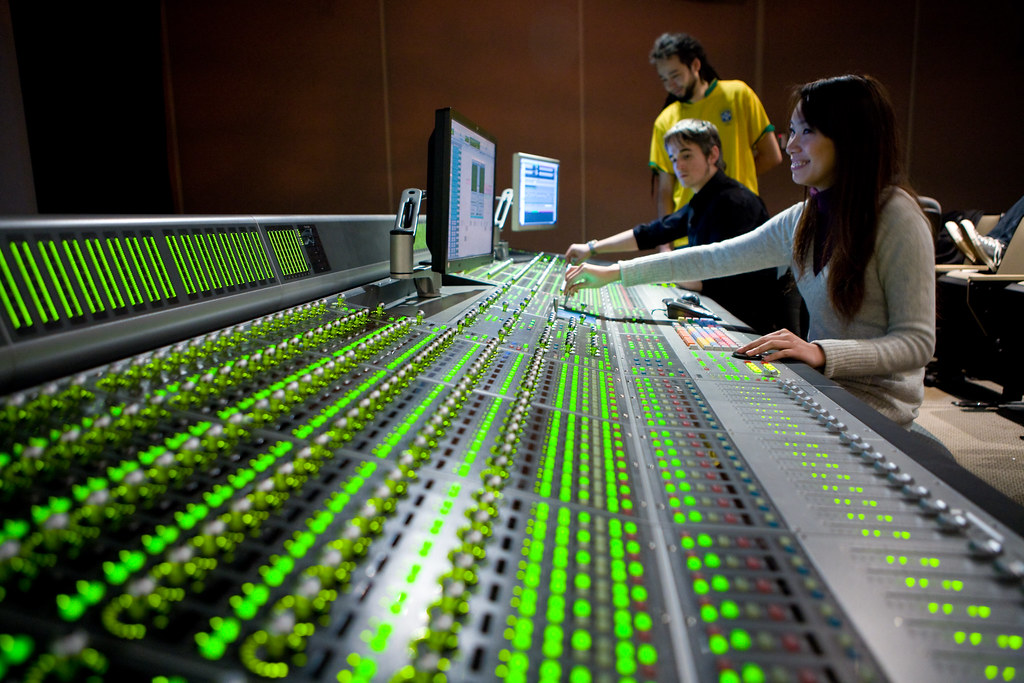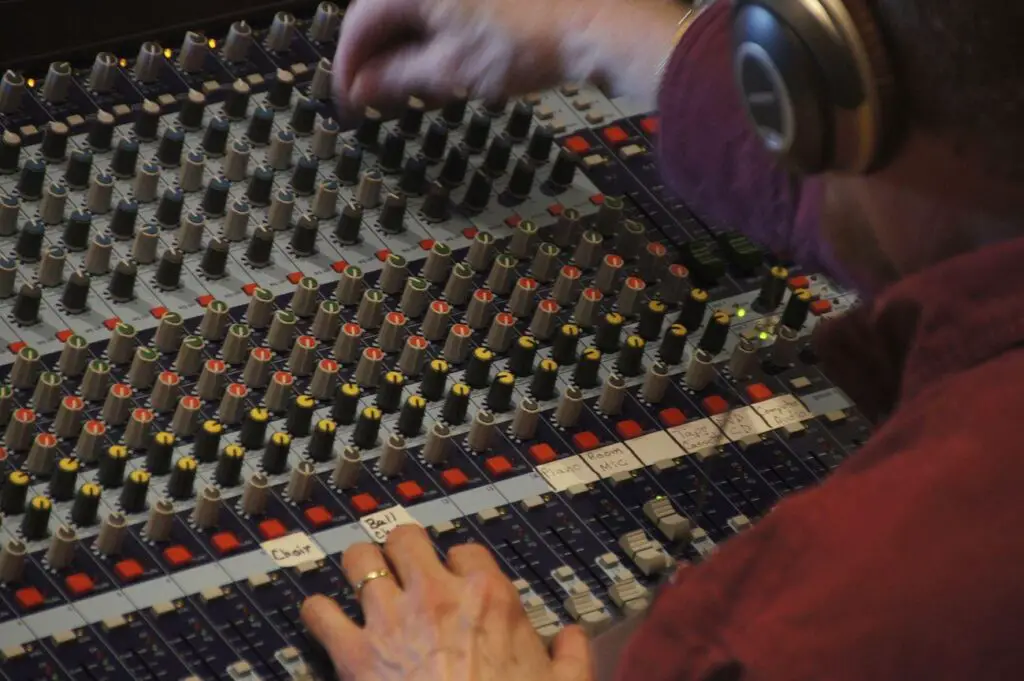Are you interested in pursuing a career in music production but don’t know where to start? Consider a music production apprenticeship. A music production apprenticeship is an educational program designed to provide aspiring music producers with hands-on experience, mentorship, and classroom instruction. Through an apprenticeship, you can gain the skills and knowledge needed to launch a successful career in the music industry. In this guide, we’ll explore everything you need to know about music production apprenticeships, including the various types of apprenticeships available, how to find and apply for an apprenticeship, what to expect during a program, and the career opportunities available after completing an apprenticeship. Whether you’re a beginner or an experienced music producer looking to take your skills to the next level, a music production apprenticeship can be a valuable step in your career journey.
Table of Contents

Definition of Music Production Apprenticeships
Music production apprenticeships are professional development programs designed to provide aspiring music producers with the opportunity to learn from experienced professionals in the music industry. These programs offer a combination of classroom instruction, hands-on training, and mentorship, and can range from a few months to several years in duration.
During a music production apprenticeship, participants gain practical experience in music production techniques, such as recording, mixing, and mastering. They also receive valuable mentorship and guidance from industry professionals, which can help them develop their skills and build their network.
Music production apprenticeships are an excellent way for individuals to gain the skills and knowledge needed to succeed in the competitive music industry. By participating in an apprenticeship program, aspiring music producers can learn from experienced professionals, build their skills and knowledge, and gain the practical experience needed to launch a successful career in music production.

Why Pursuing a Music Production Apprenticeship is Important
If you’re passionate about music production, pursuing an apprenticeship program is an excellent way to gain practical experience and develop your skills in the music industry. This program provides you with the opportunity to work alongside experienced professionals, learn best practices, and gain access to industry-specific tools and equipment. You will get hands-on training and learn from industry experts who have years of experience.
As an apprentice, you will gain practical experience that you cannot get from a classroom or online course. You will learn how to use industry-standard software, hardware, and equipment used in music production. You will also learn how to troubleshoot problems that may arise during the production process, which is crucial in the fast-paced environment of the music industry.
Moreover, completing a music production apprenticeship program can make you more competitive in the job market and increase your chances of landing a job in the music industry. You’ll have a chance to network with industry professionals, learn what employers are looking for, and gain valuable experience that will set you apart from other job candidates.
Pursuing a music production apprenticeship program is an investment in your future. It will help you develop the skills and knowledge you need to succeed in the music industry and pursue your passion for music production.

Types of Music Production Apprenticeships
Music production apprenticeships come in different types, each with its own set of benefits and drawbacks. Here are the most common types of apprenticeships:
Recording Studio Apprenticeships
Recording studio apprenticeships involve working in a recording studio under the guidance of experienced engineers and producers. Apprentices may be responsible for tasks such as setting up equipment, assisting with recording sessions, and mixing and mastering tracks. The benefits of recording studio apprenticeships are:
Benefits:
- Hands-on Experience: Apprentices get hands-on experience in a real-world setting to develop their skills in music production.
- Mentorship: Apprenticeships typically involve working alongside experienced professionals who can provide guidance and support throughout the program.
- Industry Connections: Music production apprenticeships can help apprentices develop valuable connections in the music industry, which can be beneficial when looking for future job opportunities.
- Increased Job Prospects: Completing a music production apprenticeship can make an individual more competitive in the job market and increase their chances of finding employment in the music industry.
Drawbacks:
- Low Pay: Many music production apprenticeships are unpaid or offer low wages, which can be a financial burden for apprentices who need to support themselves during the program.
- Limited Flexibility: Apprenticeships typically involve committing to a set schedule, which can make it difficult for individuals who need to work or attend school while completing the program.
- Limited Exposure: Recording studio apprenticeships can be limited to a specific area of music production, which can limit the apprentice’s exposure to other aspects of the industry.
Live Sound Apprenticeships
Live sound apprenticeships involve working in live music venues, festivals, and events, setting up and operating sound systems, and troubleshooting technical issues. The benefits of live sound apprenticeships are:
Benefits:
- Hands-on Experience: Apprentices get hands-on experience in a real-world setting to develop their skills in music production.
- Mentorship: Apprenticeships typically involve working alongside experienced professionals who can provide guidance and support throughout the program.
- Industry Connections: Music production apprenticeships can help apprentices develop valuable connections in the music industry, which can be beneficial when looking for future job opportunities.
- Increased Job Prospects: Completing a music production apprenticeship can make an individual more competitive in the job market and increase their chances of finding employment in the music industry.
Drawbacks:
- Low Pay: Many music production apprenticeships are unpaid or offer low wages, which can be a financial burden for apprentices who need to support themselves during the program.
- Limited Flexibility: Apprenticeships typically involve committing to a set schedule, which can make it difficult for individuals who need to work or attend school while completing the program.
- Limited Exposure: Live sound apprenticeships can be limited to a specific area of music production, which can limit the apprentice’s exposure to other aspects of the industry.
Music Industry Apprenticeships
Music industry apprenticeships can provide aspiring music producers with broader exposure to the music industry, including record labels, music publishers, and talent agencies. The benefits of music industry apprenticeships are:
Benefits:
- Hands-on Experience: Apprentices get hands-on experience in a real-world setting to develop their skills in music production.
- Mentorship: Apprenticeships typically involve working alongside experienced professionals who can provide guidance and support throughout the program.
- Industry Connections: Music production apprenticeships can help apprentices develop valuable connections in the music industry, which can be beneficial when looking for future job opportunities.
- Increased Job Prospects: Completing a music production apprenticeship can make an individual more competitive in the job market and increase their chances of finding employment in the music industry.
Drawbacks:
- Low Pay: Many music production apprenticeships are unpaid or offer low wages, which can be a financial burden for apprentices who need to support themselves during the program.
- Limited Flexibility: Apprenticeships typically involve committing to a set schedule, which can make it difficult for individuals who need to work or attend school while completing the program.
- Limited Exposure: Music industry apprenticeships can be limited to a specific area of music production, which can limit the apprentice’s exposure to other aspects of the industry.

How to Find Music Production Apprenticeships
Finding music production apprenticeships can be a challenging process, but there are several resources that you can use to increase your chances of success. Here are some of the most effective ways to find music production apprenticeships:
Online Resources
There are several online job boards and career sites that cater specifically to the music industry. These include Music Match, Sonicbids, and Music Jobs UK. These sites can be an excellent resource for finding open apprenticeship positions. You can also use general job search engines like Indeed and LinkedIn to find relevant job postings.
Industry Associations and Events
Joining industry associations such as the Audio Engineering Society or attending music industry events can provide you with the opportunity to network with industry professionals and learn about new job opportunities. Attending trade shows such as NAMM or AES can be an excellent way to meet potential employers and learn about the latest trends in the industry.
Search Engine Optimization
Using specific keywords when searching for jobs online can help you find more relevant results. Some of the most effective keywords to use when searching for music production apprenticeships include “music production apprenticeships”, “music industry apprenticeships”, “music production training programs”, and “music production internships”. Use these keywords when searching for jobs on Google and other search engines.
Insider Tips on Applying for a Music Production Apprenticeship
When applying for a music production apprenticeship, it’s important to make sure your application stands out from the rest. Here are some insider tips to help you increase your chances of success:
- Tailor your application to the specific apprenticeship program you’re applying for. Research the program and the company offering the apprenticeship and make sure your application addresses their specific needs and requirements.
- Emphasize your relevant skills and experience. Highlight any prior experience you have in music production, such as working in a recording studio or performing live sound. Use strong action verbs to describe your accomplishments and skills.
- Provide examples of your work. If possible, include samples of your music production work with your application to give employers a better sense of your skills and abilities. You can create a portfolio of your work and include it with your application.
- Be persistent. Music production apprenticeships can be highly competitive, so don’t be discouraged if you don’t get accepted right away. Keep applying to other programs and continue to develop your skills and experience in the meantime.

Applying for a Music Production Apprenticeship
When applying for a music production apprenticeship, you need to consider several factors that can increase your chance of success. Here are some of the most important factors to take into account:
Educational Background
Most apprenticeship programs require applicants to have a minimum level of education, such as a high school diploma or a degree in music production. Before applying, make sure to check the specific educational requirements of the program you’re interested in.
Prior Experience
Having prior experience in the music industry, such as working in a recording studio or performing live sound, can be a significant advantage when applying for an apprenticeship. Make sure to highlight any relevant experience you have in your application.
Technical Skills
Employers typically look for applicants with strong technical skills, such as proficiency with digital audio workstations (DAWs), knowledge of sound engineering principles, and the ability to troubleshoot technical issues. If you have experience with specific software or hardware, make sure to mention it in your application.
Tips for Writing a Strong Application
To stand out from other applicants, tailor your resume and cover letter to the specific apprenticeship program you’re applying for. Highlight your relevant experience and skills to make a strong case for why you’re the best candidate for the position. Additionally, make sure to proofread your application carefully to avoid any spelling or grammatical errors.
Remember, apprenticeships can be highly competitive, so it’s important to make sure your application stands out from the rest. Taking the time to carefully craft your application can pay off in the long run.
Useful related keywords: “professional development in music production”, “music production internships”, “music production mentorship”.

What to Expect During a Music Production Apprenticeship
Music production apprenticeships offer a unique opportunity for individuals to gain hands-on experience and develop skills in the music industry. During a music production apprenticeship, you can expect to gain a wide range of skills and experience that will help you kick start your career as a music producer. Some of the most common training and development opportunities available through the apprenticeship program include:
Hands-on Experience
Apprenticeships typically involve working alongside experienced professionals, gaining practical experience in the music industry. You will have the opportunity to work on real-world music projects, gaining valuable skills and knowledge that can only be acquired through hands-on experience.
Mentorship
Many apprenticeship programs provide apprentices with the opportunity to work closely with a mentor, who can provide guidance and support throughout the program. Your mentor will be an experienced professional in the music industry, who can help you develop your skills, provide feedback on your work, and offer career advice.
Classroom Instruction
Some apprenticeship programs may include classroom instruction, covering topics such as sound engineering principles, digital audio workstations (DAWs), and mixing and mastering techniques. Classroom instruction can help you gain a deeper understanding of the technical aspects of music production and learn from industry experts.
Real-World Examples of Successful Music Production Apprenticeships
To give readers a better understanding of how music production apprenticeships work in practice, here are some real-world examples of successful apprenticeships:
Example 1: Recording Studio Apprenticeship
John completed a one-year recording studio apprenticeship with a prominent music production company. During the apprenticeship, John gained hands-on experience working on a variety of recording projects and learned best practices from experienced engineers and producers. After completing the apprenticeship, John was offered a full-time job with the company as a recording engineer.
Example 2: Live Sound Apprenticeship
Samantha completed a six-month live sound apprenticeship with a local music venue. During the apprenticeship, Samantha learned how to set up and operate sound systems, troubleshoot technical issues, and work with performers and event organizers. After completing the apprenticeship, Samantha was offered a job with the venue as a live sound engineer.
Example 3: Music Industry Apprenticeship
Mike completed a two-year music industry apprenticeship with a major record label. During the apprenticeship, Mike gained exposure to various aspects of the music industry, including marketing, distribution, and artist management. After completing the apprenticeship, Mike was offered a job with the record label as a music producer.
By providing these real-world examples, readers can see the tangible benefits of music production apprenticeships and how they can lead to successful careers in the music industry.

Comparing Top Music Production Apprenticeship Programs
If you’re interested in pursuing a music production apprenticeship, it’s important to compare the different programs available in order to determine which one is the best fit for you. Here are some of the top music production apprenticeship programs to consider:
Abbey Road Institute
Abbey Road Institute offers a one-year music production apprenticeship that covers a wide range of topics, including recording techniques, music theory, and music business. Students will have the opportunity to work with industry professionals and gain hands-on experience in a real recording studio environment. Additionally, Abbey Road Institute has partnerships with various companies in the music industry, providing students with valuable networking opportunities.
Berklee Online
Berklee Online offers several online music production apprenticeships, including a six-month program focused on mixing and mastering, and a nine-month program focused on sound design. These programs are designed to be flexible and convenient, allowing students to learn at their own pace and on their own schedule. Students will have access to a team of expert instructors and a supportive community of peers.
The Clive Davis Institute of Recorded Music
The Clive Davis Institute of Recorded Music, offered by New York University, provides students with the opportunity to work with industry professionals and gain hands-on experience in music production. This program emphasizes a hands-on, project-based approach to learning, allowing students to develop their skills through real-world experiences. Additionally, students will have access to a wide range of resources and facilities, including recording studios, performance spaces, and editing suites.
Overall, these top music production apprenticeship programs offer a range of benefits and opportunities for aspiring music producers. When choosing a program, it’s important to consider factors such as the program’s curriculum, faculty, facilities, and industry partnerships. By doing your research and choosing the right program, you can set yourself up for a successful career in the music industry.

Frequently Asked Questions About Music Production Apprenticeships
If you’re considering pursuing a music production apprenticeship, you likely have some questions about what to expect. Here are some frequently asked questions that can help you better understand these programs:
What is the typical duration of a music production apprenticeship program?
The duration of music production apprenticeship programs can vary widely, depending on the program and the level of training provided. Some programs may last only a few months, while others can take several years to complete. It’s important to research the programs you’re interested in to determine their duration and whether they fit your needs and goals.
Are there any prerequisites for applying to a music production apprenticeship program?
Many music production apprenticeship programs require applicants to meet certain prerequisites, such as having a minimum level of education or experience in the music industry. Some programs may also require applicants to submit a portfolio or demonstrate their skills through an audition or interview process. Make sure to carefully review the requirements for each program you are interested in before applying.
What kind of skills can I expect to gain during a music production apprenticeship program?
Music production apprenticeship programs provide apprentices with a range of skills and experiences to help them develop their careers as music producers. Depending on the program, apprentices may gain hands-on experience in recording and producing music, learn how to use digital audio workstations (DAWs) and mixing and mastering techniques, and receive mentorship and guidance from experienced professionals in the industry. It’s important to research the curriculum of the programs you’re interested in to see what skills and experiences they offer.
Conclusion
In conclusion, music production apprenticeships are a great way to get hands-on experience and develop your skills in the music industry. Pursuing an apprenticeship can open doors to various career opportunities and can provide the necessary training and mentorship to help you achieve your music production career goals.
By following the tips and guidelines outlined in this guide, you can increase your chances of finding and securing a music production apprenticeship that’s right for you. It is important to research various apprenticeship programs, tailor your application, and make the most of the program once you’ve been accepted.
Don’t forget to network with industry associations and attend events to learn about new opportunities and connect with potential employers. Music production is a competitive and constantly evolving field, but with passion, dedication, and the right training, you can succeed in this exciting industry.
If you’re interested in learning more about music production, be sure to check out our other content for helpful tips, resources, and insights that can help you build a successful career in this field.


